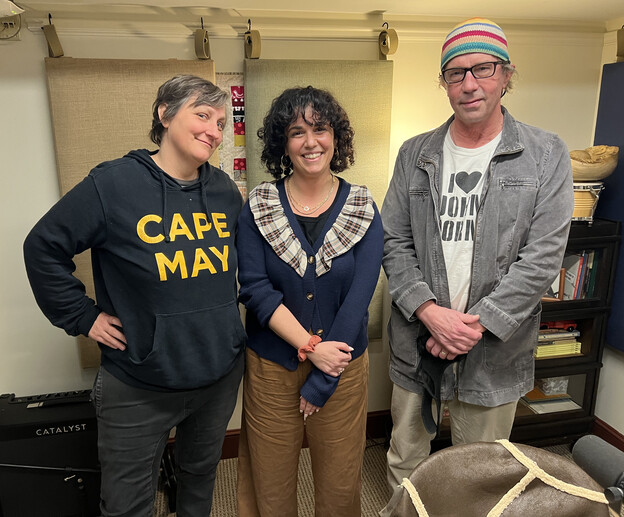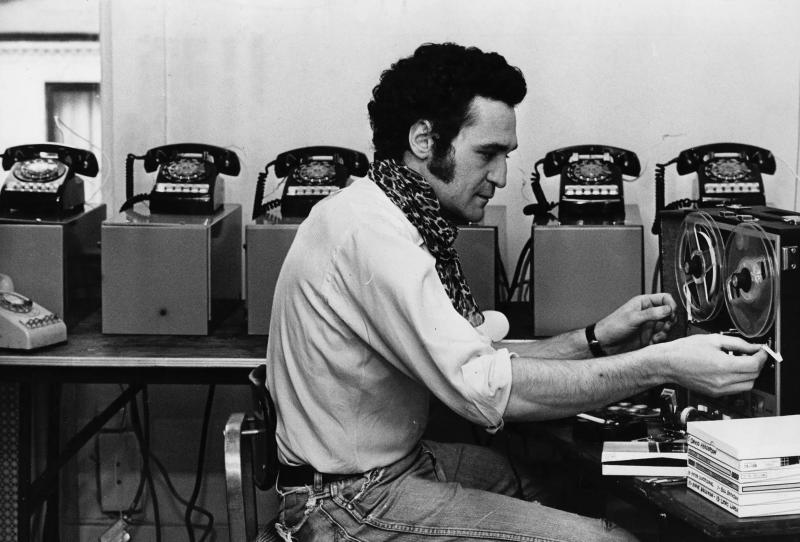
The whole world smiles (PoemTalk #184)
John Giorno, 'Everyone is a complete disappointment'

Al Filreis brought together Michelle Taransky, Brooke O’Harra, and Christopher Funkhouser to talk about a piece created, performed, and recorded by John Giorno, titled “Everyone is a complete disappointment.” It was included on the album John Giorno and Anne Waldman: A Kulchur Selection, released in 1977 from the Giorno Poetry Systems label. Among the album’s cuts are two Giorno pieces and four by Anne Waldman (famously among the latter: “Fast Speaking Woman” and “White Eyes”). “Everyone Is a Complete Disappointment” was recorded on May 1, 1977, at ZBS Media. It is nearly twenty-six minutes long, too lengthy to be played in its entirety during the opening of our podcast. Thus we post the link to the whole performance here. The excerpt we hear in the PoemTalk episode is six minutes or so.
At one point in the conversation about the way the piece registers on our ears, Brooke said to Al: “When you said ‘PoemTalk’ earlier, I misheard it as PunkTalk.” Brooke’s own auditory state was being conditioned by Giorno’s furiously edgy cacophony: “It has a rage feeling.” Al had just asked the group  about tonal indications of madness (meaning mania or psychosis), and at this moment Brooke was turning toward “mad” as a tone carried by sound rather than a narrator-speaker’s state of mind. “He’s mad. [Maybe] it’s internalized. Or he’s processing the world in that way.” Whereupon Al quotes the passage in which Giorno chants repeated variations on When you’re smiling, the whole world smiles with you (the 1928 much-covered happy ditty by Larry Shay, Mark Fisher, and Joe Goodwin), and suggests that the emphatic nonsensical result of the détournement creates an irony such that it’s possible to interpret the quoted popular phrases as always already “anodyne bullshit,” in Al’s phrase. In other words: a critique of the language of ubiquitous in-our-ears commericalism. Without irony, that is, the line’s sentiment can be commonly understood to mean this: The world is a mirror of your state of mind. Or: “If you are okay, then you will perceive that everybody around you is okay”[1] — surely, to Giorno as performance artist/poet, an atrocious social effect the avant-gardist seeks not to abet.
about tonal indications of madness (meaning mania or psychosis), and at this moment Brooke was turning toward “mad” as a tone carried by sound rather than a narrator-speaker’s state of mind. “He’s mad. [Maybe] it’s internalized. Or he’s processing the world in that way.” Whereupon Al quotes the passage in which Giorno chants repeated variations on When you’re smiling, the whole world smiles with you (the 1928 much-covered happy ditty by Larry Shay, Mark Fisher, and Joe Goodwin), and suggests that the emphatic nonsensical result of the détournement creates an irony such that it’s possible to interpret the quoted popular phrases as always already “anodyne bullshit,” in Al’s phrase. In other words: a critique of the language of ubiquitous in-our-ears commericalism. Without irony, that is, the line’s sentiment can be commonly understood to mean this: The world is a mirror of your state of mind. Or: “If you are okay, then you will perceive that everybody around you is okay”[1] — surely, to Giorno as performance artist/poet, an atrocious social effect the avant-gardist seeks not to abet.
Chris Funkhouser came to the Writers House having done some audiographical homework. No surprise there! He had learned what he could about the person who engineered the recording, having asked the Giorno Foundation people (they did not yet know any details); he discovered only that this person moved from avant-garde studio work into mainstream radio. (It put us in mind of “You give us twenty-two minutes and we’ll give you the world,” Giorno’s reference to commercial radio — the anthem of 1010 WINS in New York.) The obscurity of (crucial) details about the sound engineering making this performance art possible put Chris in mind of a critical need: “We have to come up with a new word for what he’s doing here” as a genre of studio-recorded performance.
Chris suggests that Giorno is being a “mono-dialogist.” As Giorno performs, “he’s definitely listening” to the sound of his own voice — a second person — produced by the digital delay, and “he’s tweaked the device — and practiced with the device, so he knows what to expect. It’s not all some aleatoric thing flying back at him, although I’m sure he would have been very good at that. He’s not improvising this. This is something that is coming through. The thing about all this technology, and even his use of a digital delay … well, when I first heard it I thought, This guy’s a rock star.” At that moment, as the four PoemTalkers commended Giorno’s technical, vocal, poetic, and astonishing cognitive skills put into aural action, Michelle reminds us that Giorno memorized these pieces in their entirety, even those of significant duration (recall that our piece in total is twenty-six minutes). “He wrote somewhere,” adds Michelle, “that he could memorize 1,500 lines. That to me is like a machine.”
Here are a few helpful Giorno links: 1) an interview with Daniel Nester, 2002 [LINK]; 2) PennSound’s Giorno page [LINK]; 3) the John Giorno Foundation [LINK]; 4) set list for the album [LINK].
This episode of PoemTalk was engineered by Zach Carduner and Paul Burke, and edited by Zach Carduner.
1. Edwin Trench writing for Quora.
